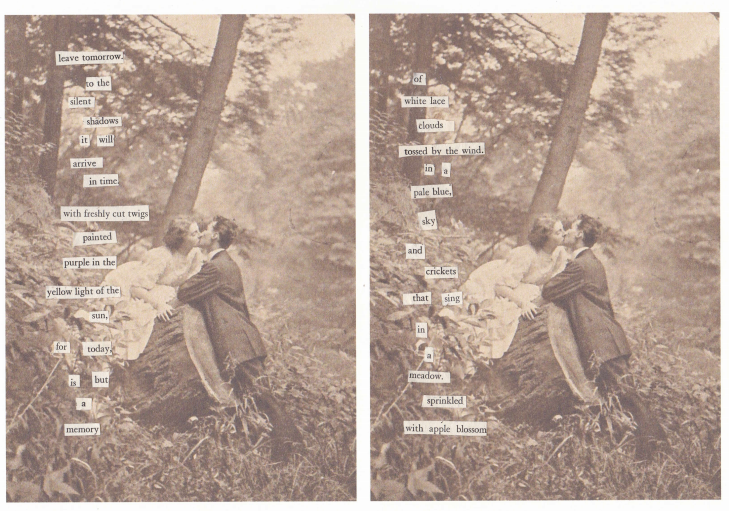Méchant
Don Noel
He was a little tyke, Mary Elaine thought, cherubic in neat blue shorts and a little man’s white dress shirt without a tie. Probably a three-year-old small for his age, but perhaps still in his terrible twos; she had no experience from which to judge. His mother was having a hard time keeping him under control. She’d brought a little blue sports car, hardly bigger than the little boy’s fist, with real wheels, and rolled it a dozen yards down the thin waiting room carpet for him to chase.
He retrieved it, turned to face his mother, and tried to roll it back. Or was that really what he tried? The tiny toy went airborne and clattered down an adjoining staircase. His harried mother persuaded him — with grim determination on her part, and obvious reluctance on his – to wait while she retrieved it.
Méchant garçon, Mary Elaine thought. Naughty boy. The French just popped into her
head, which pleased her. Even better: Applied to adults, it came back to her, the word might mean wicked or even cruel, but it meant just naughty for little boys. She felt a warm smile suffuse her face. College lessons had been three decades earlier, and getting married on the spur of the moment instead of spending a post-graduation summer in Europe meant she never got to practice her laboriously-earned skill in Paris. Harry proved to have little interest in travel.
She’d never had a little boy, either. If she had, this rambunctious lad might have been her grandson. Unexpectedly, it pleased her to imagine having progeny with more spunk than she’d exhibited most of her life.
The orthopedic’s waiting room was filled with people whose afflictions were readily
apparent: feet or legs in casts or braces, hands or arms in slings or casts or puffy gauze wrappings; canes and crutches and wheelchairs. Only the naughty boy and his patient mother offered no visible clue what either’s affliction might be.
A month ago, Mary Elaine was one of those whose huge cast was tucked into a sling. Then the cast was cut off; now her right wrist and forearm were braced in a cream-colored plastic splint, marvelously heated and shaped, form-fit, by a sculptor-technician. When she slipped it off at night, it looked on her bedside table like a huge pasta penne or rigatoni with a wide slot down its length. In the morning, she slipped her thumb in first and then squeezed the whole noodle over her forearm, securing it with Velcro straps.
An X-ray today, she hoped, would reassure the surgeon that her bone had re-knitted well enough that she could dispense with the brace, and so drive again, and cook.
Harry certainly must hope so. The original cast had made her hopelessly clumsy at the stove, and hardly able to rinse dishes, let alone wash pots. Even now the brace, form-fit or not, hindered meal preparation. He’d been complaining ever since the operation about microwaved dinners. In 28 years of marriage, Harry had been a demanding consumer of home cooking, albeit occasionally flattering.
The patients assembled in the waiting room were being called, one at a time, to a little room where a nurse took blood pressure and made sure the hospital paperwork was in order. She summoned them by first name only, presumably to comply with federal privacy laws. Having completed that step herself, Mary Elaine made a point of watching who responded when each name was called.
“Shirley?”
Naughty Boy’s mother, who had found a seat nearby and was reading a book to her
fidgety son, stood up. So it must be she, rather than her child, who was the patient today.
“Can I help?” Mary Elaine asked. “I could read to your sweet little boy while you check
in.” She hadn’t planned to offer that and was rather surprised at herself, but the prospect somehow cheered her.
“Why, how nice of you,” the mother named Shirley said, “but I think he’ll behave
coming with me.” She stood, taking the hand of her son, whom Mary Elaine had decided to think of as little Méchant.
The boy balked and threw the toy car into the air. It chanced to land quite close to Mary Elaine. She picked it up and handed it to Shirley, who led Méchant across the room to disappear into the nurse’s cubicle.
She was quite well dressed, Shirley was, in a well-tailored light purple pants-suit. Most people in the waiting room were in very casual clothes, sweat pants the most common, but also jeans and shorts (knee-length, most of the men, and more revealing, most of the women). Mary Elaine herself wore a seersucker skirt, printed in rainbow colors, that she’d bought at Tudbury’s.
For many years she hadn’t been able to afford Tudbury’s. Harry insisted from the start that they have separate bank and credit cards, and doled out money to her parsimoniously. When her aunt died and left her a substantial estate, things changed. Harry suggested they switch to a joint account, but she managed to resist that. Now she could afford to dress like a confidently stylish fifty-year-old.
Shirley was obviously having trouble with Méchant, who wanted to bolt from the nurse’s cubicle. Must make his mother’s blood pressure spike, Mary Elaine thought. She got up and went to the cubicle doorway.
“Hello, young man. I’ll bet you can’t guess what I have for you.” She had no idea what prompted that gambit, but she was pleased to find that it worked:
“What?” Méchant asked.
“You’ll have to tell me your name first,” she improvised. “You can call me Nana.”
The little boy was quite disarmed. “Okay, Nana. My name is Peter. What do you have?”
“Peter,” she said, “watch this.” She peeled back the Velcro straps, squeezed her hand and arm out of the plastic brace, and handed the contraption to a very wide-eyed little boy. “It’s a modern kind of splint,” she told him.
“Wow!” he said. “Can I put it on?”
“Sure,” she said. “Come over and sit with me while your mother talks with the nurse.”
To Mary Elaine’s surprise and his mother’s, little Méchant-Peter (as she would now think of him) compliantly walked with her back to her chair. She sat and showed him how to put it on – covering the entire length of his arm, of course – and close the straps. Definitely a small-for-his-age three — or perhaps even four — he was mature enough to manage it well. He was still putting the brace on and taking it off, murmuring “splint” to himself, when his mother finished her check-in and returned.
“My,” she said, “you have a way with children! You must be an experienced nana! How
many grands do you have?”
“Look, Mama!” Méchant-Peter said, putting his arm into and out of the brace.
“Actually, none,” Mary Elaine said. “I’m a total novice. My husband didn’t want to have children.” Which he didn’t mention until after the wedding, she recalled, by which time it was too late. In all these years, Harry had never been one to tell her much about his plans.
“What a coincidence!” Shirley said. “Mine didn’t either, which is why I’m a single mother.”
“Oh, my! He left you when you got pregnant?”
“Oh, no. He kept bitching and pressing me to have an abortion, so I threw him out.” Mary Elaine was silent a moment, trying to imagine that.
Shirley broke into her thoughts: “I suppose you didn’t do things like that in your day.”
“Oh, some did, I guess, but I was too timid even to think about it.”
“Pity,” Shirley said. “You might have remarried, had a passel of kids and be a real nana
now. But I assume you’re content with the way things worked out.”
An intrusive half-question, but apparently unintentionally so; Mary Elaine didn’t know how to respond. “I suppose,” she started to say, but just then she was rescued, a nurse calling her name to go see her surgeon. “I’m afraid I need that back,” she said to little Peter. He gave it up without a fuss; she slipped it on, tightened the straps and let the nurse lead her in.
Harry, she thought, had never in all those years doubted that he was right about everything. Even now, he was an unusually fit man for his age, which made it hard for him to understand ordinary mortals’ frailties. He’d hardly been encouraging about her operation to begin with. Osteoarthritis of the hand? A little pain never hurt anybody, he liked to say. He’d declined to get her to and from the hospital the day of the surgery, so she’d had to recruit her sister Lil. Lil had brought her again today and would fetch her home when she telephoned.
Once she was in an examining room, of course, and a nurse had looked at her wrist, she had to wait for the doctor. Doctors always assume that their time is far more important than patients’, she thought – not unlike Harry. She began to wonder whether she wanted to go home and make dinner tonight. She could always put the plastic noodle splint back on, even if the doctor said it was no longer needed.
She wondered if Shirley’s husband – no, ex-husband — was as big as Harry. The other meanings of méchant popped into her mind. She tried to conjure the scene in her mind’s eye: Her new acquaintance Shirley insisting on carrying her child to term, and showing her méchant husband the door. The image brought a smile to Mary Elaine’s lips. She felt the smile there, and let it broaden.
Which was exactly when Shirley and her little boy passed by the door, being shown to an examining room themselves. Méchant-Peter was peering into cubicles as he passed them, of course, and saw her.
“What are you laughing at?” he called.
“Peter!” his mother said. “That’s not polite!”
“I’m just glad to see you again,” Mary Elaine said, and knew it was true.
Shirley was evidently being shown to the examining room right next door, and her son was equally evidently not inclined to hurry into the little room. His head re-appeared in her doorway.
“Can I play with your splint again?”
“Tell you what,” she told him. “We seem to be on the same timetable. Tell your mother I’ll tarry in the waiting room for a little while when I’m through here.”
Shirley’s head appeared in the doorway. She had obviously come back to get her son and overheard.
“Thank you!” she said. “And if we get there first, we’ll wait for you.”
“We have a date,” Mary Elaine called after the departing heads.
She was still smiling at the thought of chatting with Méchant-Peter again when the doctor arrived. “I judge from the look on your face that your hand can’t be very painful.”
“Oh, no, doctor. Not at all. I was smiling at the little boy who’s just gone into the cubicle next door.”
“That would be Peter. I suppose I shouldn’t discuss other patients, but we’re trying to decide how best to treat his mother’s carpal tunnel pain, and her little boy is a pain elsewhere, if you know what I mean.”
Mary Elaine let a wide grin suffuse her face again. “He just needs to be distracted,” she told the doctor. “He’s been playing with my splint.”
“I’d say you could give it to him,” the doctor said, “but I’d rather you wore it for a few weeks longer when you’re walking or at any risk of falling.” He had been examining her hand as they talked. “If you tried to catch yourself with this hand, at this point, you still might undo my hard work.” He would have her come back in another month and take an x-ray to see how densely the bones had grown together.
And that was it. In a moment she was being led back to the waiting room. Be at the clinic a half-hour early, wait another half-hour in a cubicle — sometimes stripped down to a chilly paper gown — then spend four minutes with the doctor. She caught herself almost laughing: Just like my sex life, she thought.
This was the moment when she ought to phone her sister Lil to come to get her. She found herself thinking she might ask Lil to take her home, wait while she packed an overnight bag, and then spend a night or two in Lil’s spare bedroom. But of course that was foolishness, and in any case she wasn’t ready to be picked up yet.
In only a few minutes Shirley and her son appeared, and Méchant-Peter immediately borrowed the plastic splint and occupied himself with it. He soon discovered that it could be used as a tunnel for the toy car and as a telescope, too. Starting to talk to his mother, Mary Elaine felt herself being studied. She turned, looked down the tube to find his little-boy eye, and gave him a big wink. He giggled.
“You know,” Shirley was saying, “we live only ten minutes from the hospital. How are you getting home?”
Mary Elaine explained about Lil.
“Wonderful!” Shirley said. “Let’s go have a sandwich and cold soup at my house – nothing fancy – and your sister can collect you there. Or Peter and I might take you home.”
“That would be nice,” Mary Elaine said, then hesitated. “I don’t want to impose.”
“No imposition. Peter would love to have you.”
“Is she coming to our house?” Méchant-Peter asked.
“I think so,” Shirley told her son. “You help invite her!”
“Oh please, Nana, come to our house! I’ll show you my Lego sculptures.”
“And we can talk about how things have changed in a few decades,” Shirley added. “Women’s liberation and all that.”
Wicked, Mary Elaine thought to herself. Méchant. And perhaps important. “Yes,” she heard herself say. “Thank you. Yes, let’s.”
Don Noel







